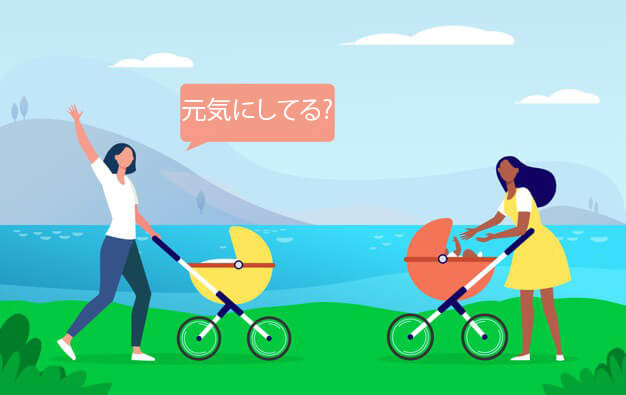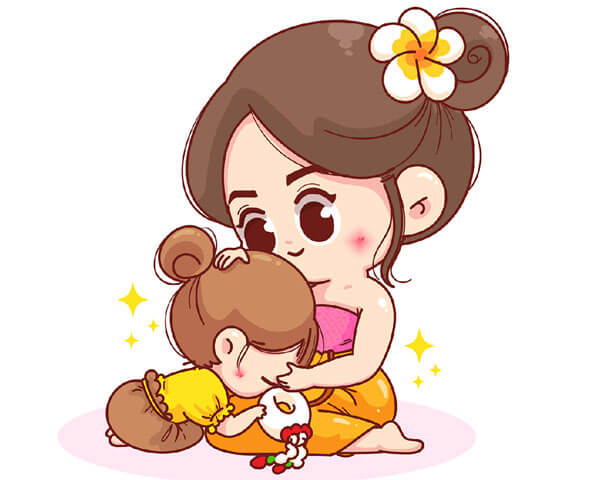how to say what about you in japanese
Asking someone "How are yous?" is a simple greeting that we commonly apply in English language. Nosotros use it frequently equally a chat opener when we want to be polite. In Japanese notwithstanding, despite being a polite language, nosotros don't use this phrase not well-nigh to the same extent as nosotros practice in English. It'southward more common to greet the person with a simple "hello," or "expert morn" and jump direct into a conversation.
You'd think that existence a language with various forms of language honorifics, not asking someone how they are would be considered rude. Instead, it's more the level of politeness y'all apply in your greetings that matters the most in Japanese.
In Japanese, information technology could be considered a little besides direct if y'all were to enquire anybody how they are all of the time. For instance, in English, we might ask the shop cashier "how are you" while we're being served. This kind of small talk is mostly absent in Japanese culture, at least, the asking of how someone is doing is.
So what if yous genuinely want to ask someone how they are, or how they've been in Japanese?
In that location are plenty of phrases and expressions that you lot can use to convey a "How are you" in Japanese. There are a few of them actually. Although you won't be using this phrase anywhere near every bit much as you practice in English, there are situations when y'all'll definitely want to ask someone how they are.
In this mail, we're going to explore all of the nearly appropriate means on how to say "How are you" in Japanese, and the situations when you lot can use them.
Author'due south Notation: The sound files presented are the natural mode to pronounce each entry of "How Are You" in Japanese, so I recommend using them when referring to pronunciation if y'all can!
How Are You in Japanese
- How are you?
元気?
genki
The best Japanese expression y'all tin employ to convey a significant similar to the English "How are yous" is 元気 (genki).
Although a simple greeting would exist sufficient enough in Japanese culture, sometimes you'll want to ask someone how they are, before jumping into a chat.
When yous exercise, 元気 (genki) is the phrase you're going to desire to apply. In Japanese, we utilize 元気 (genki) oftentimes, especially when we haven't seen someone in a while. For instance, We would say to a friend whom we haven't seen for a while 元気?(genki?) to enquire them how they are, or how they've been. On the other paw, we probably wouldn't utilise information technology if we had merely seen the friend yesterday.
元気 (genki) really means: lively; full of spirit; energetic; well.
So technically, when you utilise this phrase y'all are asking someone "Are y'all well?" You tin can utilise 元気 (genki) as a reply likewise. If someone asks you "元気?" You can simply reply with "元気だよ" (genki dayo), which means "I am well" in Japanese.
How Are Yous Formality
Despite a high frequency of asking "how are you" being absent in Japanese civilization, Japanese is nevertheless a polite language. Depending on who you're speaking to, you might need to speak politely.
If you were speaking to a manager, an acquaintance, or to someone who is not a close friend or family member, y'all should avert simply proverb 元気 (genki). Instead, y'all can select from two polite versions.
- 元気ですか (genki desuka)
- お元気ですか (ogenki desuka)
Attachingですか (desuka), turns this phase into a polite question. Attaching お (o) makes the phrase even politer. By including the お (o) yous essentially beautify the following word, increasing your politeness even more. Which one you lot use is up to yous, and how polite you want to be.
More than Means to say How Are You
- How are yous?
調子はどう?
choushi ha dou?
In that location are three components of this next expression. Let'southward break them downward a little.
調子 (choushi) – This is a noun, meaning "condition" or "state of health" in Japanese.
は (ha) – This is a subject marker particle that places emphasis on the preceding word as the main topic of the sentence.
どう (dou) is an adverb that we use to enquire questions such as "how" or "how about" in Japanese.
If we combine the three components we can see that the literal significant of this expression would mean "how is the condition?" or "How is the state of health?"
In Japanese, we often omit pronouns, and in this case too. Here, "Yous" is already understood by the listener that you're already talking to them. Efficient right?
Similar to 元気 (genki), (explained in a higher place), you might use this expression afterward you see a friend for the first time in a while. When you come across them, at the beginning of the encounter yous might say, 調子はどう? (choushi ha dou). In this case, you can translate it similarly to "What'south up," or "How are you."
We don't really walk up to each other and ask 調子はどう?(choushi ha dou) as it's not in the Japanese culture to start a conversation with "How are yous?".
You can, notwithstanding, utilise this expression when you want to ask someone how they are when you're with them at the office, before a presentation, or at a theme park having fun with friends. This interpretation would be more like "How are you feeling/doing" in Japanese.
Formality: In business situations, don't forget to attach ですか to the expression! This makes it 調子はどうですか? (choushi ha dou desuka).
How Are Things (Recently)

- How are things? (recently)
最近はどう
saikin ha dou?
This adjacent expression also uses three components.
最近 (saikin) – This word means "recently" in Japanese.
The adjacent ii components are the aforementioned as the ones found in 調子はどう (choushi ha dou), above.
Next up, は (ha) marks the give-and-take preceding information technology as the field of study of the judgement.
どう (dou) – An adverb that ways "how" in Japanese.
In Japanese, we oft omit many parts of the judgement. The omission of pronouns is particularly mutual. We omit it here likewise as information technology is already understood past the listener that they are existence spoken to.
With that said, if we combine the three components we construct a judgement that would literally translate to "Recently, how is?" or "How is recently?" in English.
The great thing virtually 最近はどう (saikin ha dou) is that it'southward more obvious in regards to when you should utilize information technology. You tin can use this expression in the verbal same fashion as when you lot ask someone "how are things recently?" in English.
The biggest divergence with this expression is that different 元気 (genki) and 調子はどう (choushi ha dou) you lot are not request someone specifically how they are in regards to their "condition". This gives the states more than flexibility with situations when nosotros can use this expression. Therefore, you could use it when you want to inquire someone how their workdays have been recently, or ask only in general how they are.
Formality: Of class, just like the previous entries, you're going to need to attach ですか (desu ka) to expression during business/formal conversations. This would make it 最近はどうですか? (saikin ha dou desuka) when you desire to speak politely.
What'southward Up? in Japanese
In English, sometimes we apply "What'due south upwardly" as a more than casual variant of "How are you". You lot can use "What'south up" as a greeting, or as an expression of business organisation for someone similar to "What happened?". Nosotros also have an ultimate guide on how to say "What's up" in Japanese.
- What'due south up in Japanese
どうしたの?
dou shita no?
どうしたの (dou shita no), is an expression that is non used equally a greeting. Instead nosotros mostly apply it when it is implied that something has happened to the person who is calling you.
For instance, say you're upstairs in your room, and suddenly you hear your flatmate calling your name from the kitchen. Yous head downstairs to see what'south up, and at this moment, you could say どうしたの?(dou shita no), meaning "What'southward up" in Japanese.
- 私を呼んでいた?どうしたの?
watashi wo yondeita? dou shita no?
Were you calling me? What's up?
You could translate this expression as something with similar nuances to "What'due south the matter" in English language.
Formality: Firstly, let'due south look at the ending of どうしたの?(dou shita no). The の (no) adds more emotion to the expression. Information technology tells the listener that you care that fiddling flake extra.
You could say どうした?(dou shi ta) without the の (no), nonetheless, depending on the situation, information technology could come beyond as somewhat cold. Notation, that this expression is a casual one.
If you lot're speaking to a colleague, manager, or stranger, for instance, you'll need to exist polite. Yous can do this past changing the expression to どうしましたか (dou shi mashita ka).
How Are You Doing/How Is Information technology Going?

- How is it going?
元気にしてる?
genki ni shi te iru?
In a situation when you haven't seen a friend in a while you might want to ask them how they've been. Say for instance yous've merely bumped into a friend yous haven't seen for a few weeks. As an initial greeting, you might call their name, and then immediately ask, 元気にしている (genki ni shi te iru).
In this situation, we can interpret it as something similar to "hey, how's it going?" in English. If you lot desire to sound even more natural, you could throw in a 久しぶり (hisashiburi) after yous say their name. 久しぶり (hisashiburi) means "Long time no encounter" in Japanese. The whole phrase would sound something like this:
- {proper noun}! 久しぶり! 元気にしている?
{name}! hisashiburi! genki ni shi te iru?
{name}! Long fourth dimension no see! How is it going?
You can utilize this phrase as a very friendly breezy greeting in Japanese.
If you're interested, accept a quick glance at this video for a deeper explanation!
Jumping back to 元気にしている (genki ni shi te iru), permit'southward break information technology down a little and so we can improve understand it. The phrase has three components.
- 元気 (genki) – a substantive that ways "lively, full of spirit, well" You can bank check a full caption on this page at the top. 元気 is the first entry.
- に (ni) – is a Japanese grammer particle that has many variations. I recommend this ultimate guide for full explanations on the uses of に should y'all need information technology. In this example, に connects the noun to the verb.
- している (shi te iru) – is the present progressive form of the verb する (suru), which ways "to do."
Combing these components together we accept a phrase that tin literally be translated as "doing well?" in Japanese. As pronouns are oftentimes omitted, 元気にしている (genki ni shi te iru) translates every bit "Are you doing well?" in Japanese.
Polite How Are Y'all Doing in Japanese
- How are yous doing?
いかがですか
ika ga desu ka?
いかがですか (ika ga desuka) is a very formal expression that we use in Japanese when we need to be polite. It is perfect to utilize when speaking with managers, teachers, someone who is of a higher condition, or with people who you don't know too well.
With other expressions such as 元気 (genki), people volition instantly sympathise that you lot are asking them virtually their status/how they are feeling. Whereas いかがですか (ika ga desu ka) points towards something different. A literal translation of this expression would be "How is (10) going?" or "How is (something)?"
When yous enquire someone いかがですか (ika ga desu ka), you tin can state the topic in which you are asking them about. When you do, people will understand what information technology is exactly you're asking them about.
For example, you could enquire someone "How is piece of work going?" in Japanese. Firstly the word for "work" in Japanese is 仕事 (shigoto). After you lot accept introduced the topic, (in this instance, work), before you say いかがですか (ika ga desu ka), yous always have to insert the topic marker particle.
The topic marker particle tells the listener that the preceding word is the topic of the sentence. The topic marker particle in Japanese is は (ha). Then the consummate phrase is:
- 仕事はいかがですか
shigoto ha ika ga desuka?
How is work going? (Formal)
Yous can but bandy the substantive of the sentence for whatever other of your choice. To inquire how one's babe was doing in Japanese for instance, you swap the word for "work," for "baby." The Japanese word for infant is 赤ちゃん (aka chan).
- 赤ちゃんはいかがですか
aka chan ha ika ga desu ka
How is the infant doing? (Formal)
How Are You Feeling

- How are y'all feeling?
体調はどう?
taichou ha dou?
If someone looks like they aren't feeling too well, you might desire to inquire them how they are feeling. In Japanese, we say 体調はどう?(taichou ha dou).
The showtime component of this expression is 体調 (taichou) which means "physical condition" (of one's body) or "land of wellness."
The second component is は (ha). In Japanese grammer, は (ha) functions as a topic marker that marks 体調 (taichou) the subject of the sentence.
Lastly, どう (dou) means "how" in Japanese. Combining these components together we have a sentence that literally ways "How is the state of health" in Japanese. So, how and when tin yous utilize it?
If someone looks unwell, you tin can ask them 体調はどう? (taichou ha dou). Later on, the next day you see them you could also repeat the question and inquire them once more.
- おはよう。今日体調はどう?
ohayou. kyou taichou ha dou?
Skillful morning. How are you feeling today?
For the most role, you can use this expression the verbal same way as y'all would use "How are you lot feeling?" in English. 1 exception to this might be if you're asking someone how they are feeling before an of import test or job interview for instance. In these cases, y'all volition sound much more natural if yous were to inquire "Are you Okay?" instead.
Formality:This is an informal expression, so yous volition need to use its formal counterpart in business situations or when speaking with people who are of a higher condition than yourself. To say "How are you lot feeling" in Japanese politely, you tin use 体調はどうですか (taichou ha dou desuka).
Are Yous Okay? in Japanese

- Are you okay?
大丈夫?
daijoubu
If someone looks unwell, nervous, unsure, or only non content with a situation, you lot'll probably want to ask them if they are okay.
大丈夫 (daijoubu) is the about common way to say "Are you okay?" in Japanese. This expression is super easy to use as it has the same nuances as in English.
For case, say a friend is shaking nervously before their super of import test, you lot could ask them 大丈夫?(daijoubu). Too, if you become skiing with your friend and you autumn face-first into the snowfall, they might shout to you 大丈夫?(daijoubu).
- 痛そう!大丈夫?
itasou! daijobu?
That looks painful! Are yous okay?
Formality: When speaking with people you aren't friends with, such as strangers, you're going to need to utilize 大丈夫ですか (daijoubu desuka). The ですか (desuka) transforms the expression into a polite one.
For example, if you're on an plane to Japan and a passenger sitting next to you looks a little unsteady, you might ask them 大丈夫ですか?(daijoubu desuka). This ways "Are you okay?" or "Are you lot alright?" in Japanese.
Responding to Are Y'all Okay? in Japanese
What is great virtually 大丈夫 (daijoubu) is that you can use information technology equally a response besides. As previously mentioned, when we speak Japanese, we frequently omit pronouns every bit information technology is mostly understood who is beingness referred to.
For example, after someone asks you 大丈夫?(daijoubu), you could respond with those very words: 大丈夫! (daijoubu). Responding to "Are you okay?" in Japanese with 大丈夫 (daijoubu) is the aforementioned as proverb "I am okay" in English.
- 大丈夫!
daijoubu!
I'm okay!
However, if you are not okay though, you tin can say 大丈夫じゃない (daijobu janai). This means "I am non okay" in Japanese.
I Hope Yous Feel Better Before long

- I hope you feel improve presently
お大事に
odaiji ni
Afterwards you've asked someone how they feel, you might want to tell them "I hope yous feel better soon" in Japanese. When someone is feeling unwell, in Japanese we say お大事に (odaiji ni). For more information on how to say Hope in Japanese, have a glance at this ultimate guide!
It is the closest Japanese expression that means the same as "go well soon" in English language.
After someone sneezes, for instance, yous might say お大事に (odaiji ni) which ways "bless y'all" in Japanese. Of course, in English language, nosotros don't say "I hope you lot feel better soon" after someone sneezes, but saying お大事に (odaiji ni) is a kind way of telling someone to take care of themselves.
If someone is ill, or if they tell you they feel unwell, you can likewise say お大事に (odaiji ni). This tells the person that yous are hoping for them to become well soon. The cute matter nearly this expression is that you tin can use it in both formal and informal circumstances.
How Was Your Day?
- How was your mean solar day?
今日はどうだった?
kyou ha dou datta?
Sometimes, when we ask someone "How are yous?" nosotros're request how their day was as a whole.
Y'all tin say "How was your 24-hour interval" in Japanese past maxim 今日はどうだった?(kyou ha dou datta). It has the exact same functions every bit the way you ask someone how their day was in English language.
You might inquire someone how their day was after a day at work for instance, or afterward a 24-hour interval of classes. Alternatively, y'all might want to say "Take a good day" to someone before their day begins. There are plenty of ways of wishing someone a good day in Japanese.
- お帰り!今日はどうだった?
okaeri! kyou ha doudatta?
Welcome domicile! How was your twenty-four hours?
For all of the possible means on how to wish someone having a good day in Japanese, have a look at this ultimate guide on "How to say Accept a Adieu in Japanese".
The first component of this phrase is 今日 (kyou) which means "24-hour interval" in Japanese. どうだった (doudatta) is a past tense component which translates as "how was" in English. As discussed earlier, nosotros know that Japanese pronouns are often omitted. Hence why at that place is no "you" in this phrase.
Combining them together, we have a phrase that literally means "How was your day?" in Japanese.
How Was Your 24-hour interval Politely in Japanese
Think the いかがですか (ika ga desu ka) we covered earlier? By itself, いかがですか (ika ga desu ka) is a very formal fashion of saying "How was (something)" Japanese.
Following the same format we discussed before (topic+いかがですか), we can accept the give-and-take for "day" in Japanese: 今日 (kyou) and attach it to the outset of いかがですか (ika ga desu ka). This makes the phrase:
- 今日はいかがですか?
kyou ha ika ga desu ka?
How was your twenty-four hours? (Formal)
You can utilize the above phrase to ask someone "How was your twenty-four hour period" politely in Japanese.
How Did It Go
- How did it go?
どうだった?
dou datta?
Imagine you're accompanying a family member to the doctor for their appointment. You patiently wait outside equally they encounter the doctor. Waiting in apprehension you wonder if they are okay. When they do finally finish, you see them, and yous'll probably ask something along the lines of "How did it go?".
For situations like to these, you can employ どうだった (dou datta) to ask someone "How did it get?" in Japanese. Another example might be after a friend finishes taking an exam, and yous could ask them どうだった (dou datta).
To be more specific in what it is you lot're specifically referring to, yous can say the: noun+は+どうだった. For instance, the word for examination in Japanese is 試験 (shiken). You would say:
- 試験はどうだった??
shiken ha dou datta?
How was the exam?
This ways "How was the test?" or "How did the examination get" in Japanese.
Formality: To ask "How did it go" politely in Japanese, you modify だった (datta) to でしたか (deshita ka).
This makes the phrase どうでしたか?(dou deshita ka) which is a formal way of saying "How did it go" in Japanese.
There you accept it! There is a bunch of ways that y'all can say "How are yous" in Japanese. I promise I was able to help you find a suitable expression for any state of affairs when you desire to ask someone how they are. Should you lot accept any specific questions regarding the Japanese language or culture, delight contact me here or leave a comment beneath!
See you adjacent time!
Further Ultimate Guides:
How to say No Problem in Japanese
How to say Good Luck in Japanese
Resources:
Free Japanese Reading Exercises
Source: https://thelanguagequest.com/how-are-you-in-japanese/
0 Response to "how to say what about you in japanese"
Post a Comment